Abstract
An important condition for a teacher’s successful professional activity is the use of an integrative approach. This approach presupposes: (1) expanding the lesson’s content including information from related fields of knowledge in order to form a multidimensional world picture, (2) creating educational situations that require solving real life problems on the basis of contextual application of knowledge and skills, (3) the variable use of modern pedagogical tools. A comparative study was conducted in Russia, Ukraine and China (in 2015-2017) to determine the readiness of teachers to use an integrative approach in educational practice. It involves readiness assessment of geography teachers for integrative approach introduction in studying sustainable development problems, as well as the arising difficulties analysis and the ways to overcome them. The study included questionnaires and interviews with teachers, expert opinions, databases and analytical notes for the three countries. 537 respondents (school and college teachers, University professors, specialists in the field of retraining), including 192 from Russia, 144 from Ukraine and 237 from China took part in the research. The study results indicate that teachers from the three countries share common difficulties and express similar views on the need to improve their preparation for using an integrative approach. It is noted that a serious disadvantage of modern pedagogical education is the lack of special reference and information resources, elective courses, professional communication environment which help the teacher to develop and implement into educational practice the assignments for studying the realities of modern life using knowledge from different scientific fields.
Keywords: Integrative approachcomparative studiesteacher educationinterdisciplinary connections
Introduction
In modern educational practice, the integrative approach is considered as the ‘the imperatives of our era’ in which the younger generation is to live. Rapid development of border scientific areas, broad interdisciplinary integration in the study of complex fundamental and applied problems pose a challenge to the field of education: to generate a holistic world picture which will reflect scientific achievements and realities of life. Attempts to solve this problem have led the international community to numerous experiments on the creation of integrated educational disciplines (Duschl, 2007; Ford, & Wargo, 2012), to conduct studies for evaluating educational results on the basis of tasks that require the contextual use of information from different subjects (OECD, 2000), finally, to the development of innovative pedagogical technologies (Osborne, 2010; Stukalenko, Anishchenko, & Turtkarajeva, 2013). However, the pedagogical search continues, as the available options for the implementation of the integrative approach have their advantages and disadvantages.
The pedagogical literature contains different interpretations of the integrative approach, reflecting the ambiguity of its understanding by the professional community. Most often, the integrative approach is considered as an alternative to the dominant narrow (disciplinary) training in schools (Maximchenko, 2011). The traditional structure of educational subjects, which has developed over several centuries, significantly limits the opportunities for students to form a modern view on the world, which unites almost all areas of knowledge and focuses on solving practical problems. On the other hand, integrated academic disciplines do not allow forming a coherent and effective system of scientific knowledge. That is why the search for ‘smart integration’ continues in all educational systems around the world (Osborne, & Dillon, 2008).
International comparative studies are of particular interest: they reflect the current diversity of cultural traditions, national priorities, educational environment conditions and new opportunities. The study of an integrative approach prospects in the course of comparative international studies allows describing the actual educational state, comparing alternative solutions to problems, revealing their causes and choosing the best ways for development. The objects of comparative analysis can be education systems, educational process components and, finally, its agents.
Identification of the actual educational state is the starting point of the analysis, a prerequisite for subsequent practical decisions on the educational process modernization at all levels. In the context of solving the problem of improving teachers’ training for implementing an integrative approach, this means the need for a detailed and comprehensive analysis of the situation, identifying common to different countries and specific features (Khlebosolova, 2016).
Problem Statement
Within the framework of this research, an attempt is made to look at the future of the integrative approach from the teacher’s perspective, as the most active and important guide for this idea in school educational practice. The comparative analysis included the views and assessments expressed by geography teachers from three countries (Russia, Ukraine and China) on the issue of including into the lesson an additional material that is closely related to the subject and at the same time is of great ideological and practical importance (sustainable development principles).
Research Questions
The study aims at solving the following issues:
The study of readiness of teachers from the three countries to implement an integrative approach into educational practice
Readiness to implement an integrative approach is considered as a result of teacher's self-assessment of the following professional activity aspects:
the desire to include into the lesson the material that goes beyond the content of the software to expand the scientific world picture and identify the relationship of a particular discipline with the realities of life,
opportunities to independently develop additional methodological materials and use them systematically,
freedom to use a variety of educational technologies.
Promising areas for improving the professional training system
The professional training effectiveness depends on the compliance / non-compliance of its content with the goals of social development and the students’ needs. In this regard, the results of teachers’ self-assessment of the difficulties in using the integrative approach and the possibilities of their elimination are of paramount importance for determining the perspective directions of training improvement in basic professional and additional educational system.
Assessment results comparison between countries to identify common training challenges and alternatives
Training problems can be general and specific. The comparison of the results of the self-assessment by teachers from the three countries whether they are ready to implement an integrative approach as well as of emerging problems allows:
to take into account the diversity of educational practices,
to focus on the most common prospects and long-term objectives,
to find out common approaches and implement them into the system of professional training .
Purpose of the Study
The purpose of the study is to assess the teachers’ readiness for implementing the integrative approach into the educational process in Russia, Ukraine and China in order to determine the prospects of improving professional skills..
Research Methods
During the study, various methods were used: theoretical (comparative analysis, generalization, modeling), diagnostic (interviewing, questionnaires, expert evaluation method), empirical (the study of regulatory and academic documentation), as well as the methods of mathematical statistics and graphical display of the final results (Кhlebosolova, 2016).
The study of teachers’ opinions was carried out on the basis of their interviewing and questioning (including online). The content of the questionnaire included the identification of the respondents’ views on the problem, difficulties in using an integrative approach, unrealized opportunities for basic professional and additional education and prospects for self-education.
Analysis of the interviews and questionnaires results included the creation of databases on the following topics:
General information about the respondents:
-
sex,
-
age,
-
region,
-
educational level,
-
specialty,
-
pedagogical experience,
-
subjects taught,
-
age.
Prerequisites for the introduction of an integrative approach to educational practice:
-
teachers’ readiness to include into the lesson the material that goes beyond the content,
-
willingness to develop learning situation that focuses students’ attention on the practical value of the subject,
-
willingness to systematically use an integrative approach in the educational process,
-
correspondence of educational and methodical literature with the teachers’ requests,
-
selection of the most effective means of implementing the integrative approach.
Prospects of self-education and professional growth:
-
the teachers’ needs in the study of scientific areas related to the subject,
-
teachers’ choice of the most "necessary" (from their point of view) topics and sections of additional education,
-
evaluation of teachers’ interpretation of the "perfect course" that allows them to prepare for an integrative approach implementation,
-
methodological problems.
-
The study was conducted in three stages and included:
-
the development of the assessment matrix, test materials, data bases,
-
teachers’ interviewing and questioning in order to identify their views, needs and suggestions,
-
processing of the study results, preparation of the reports on countries and on the results of comparative studies.
Expert opinions were drawn up in arbitrary form and collected in 2016-2017. .
Findings
The results of the study are given in comparison to the three countries, marked by common features and differences. They reflect the most important aspects of the current state and prospects of using the integrative approach in educational practice.
The analysis of general information about the respondents results
The study involved 192 respondents from 10 regions of Russia (Figure
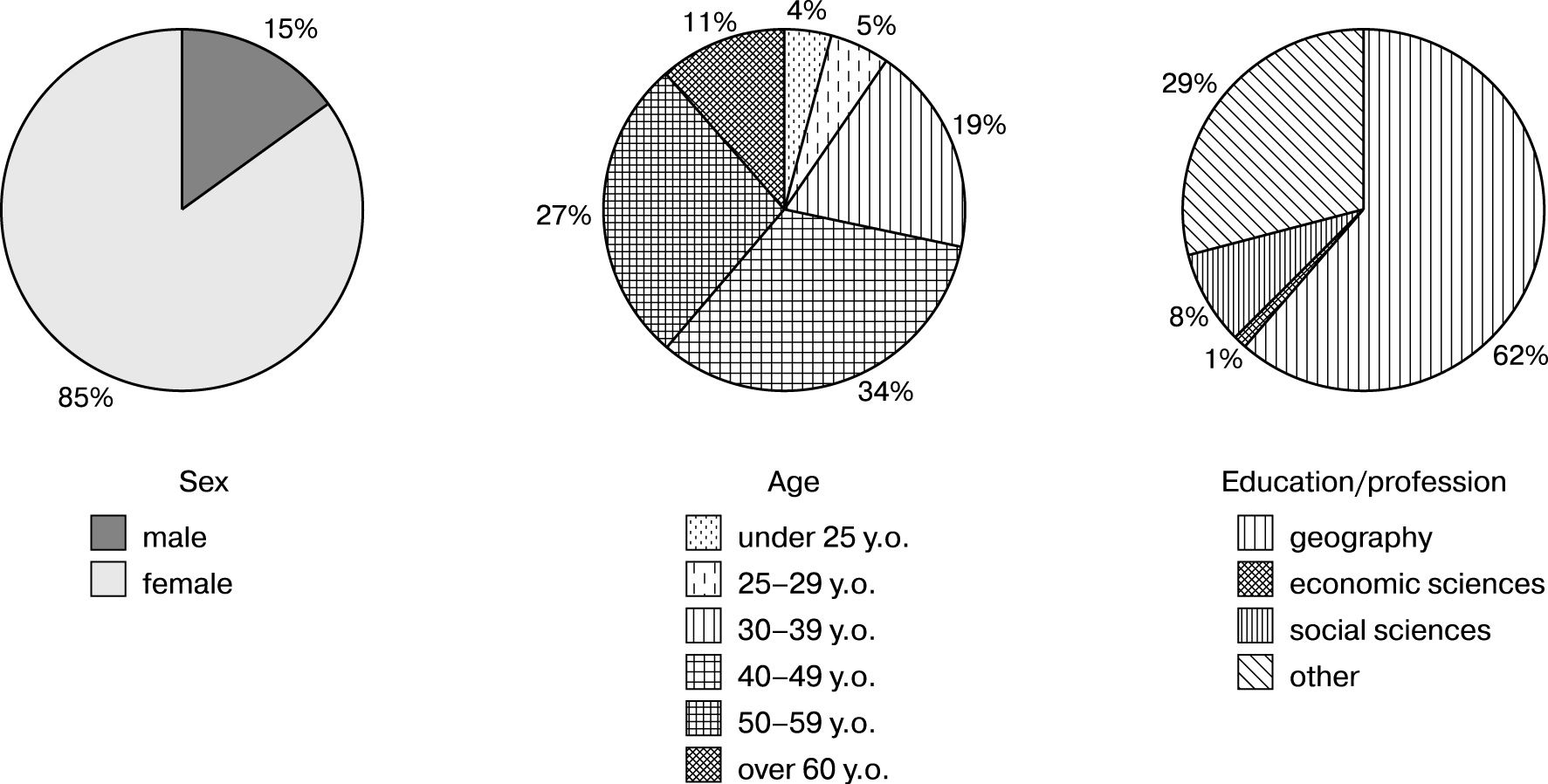
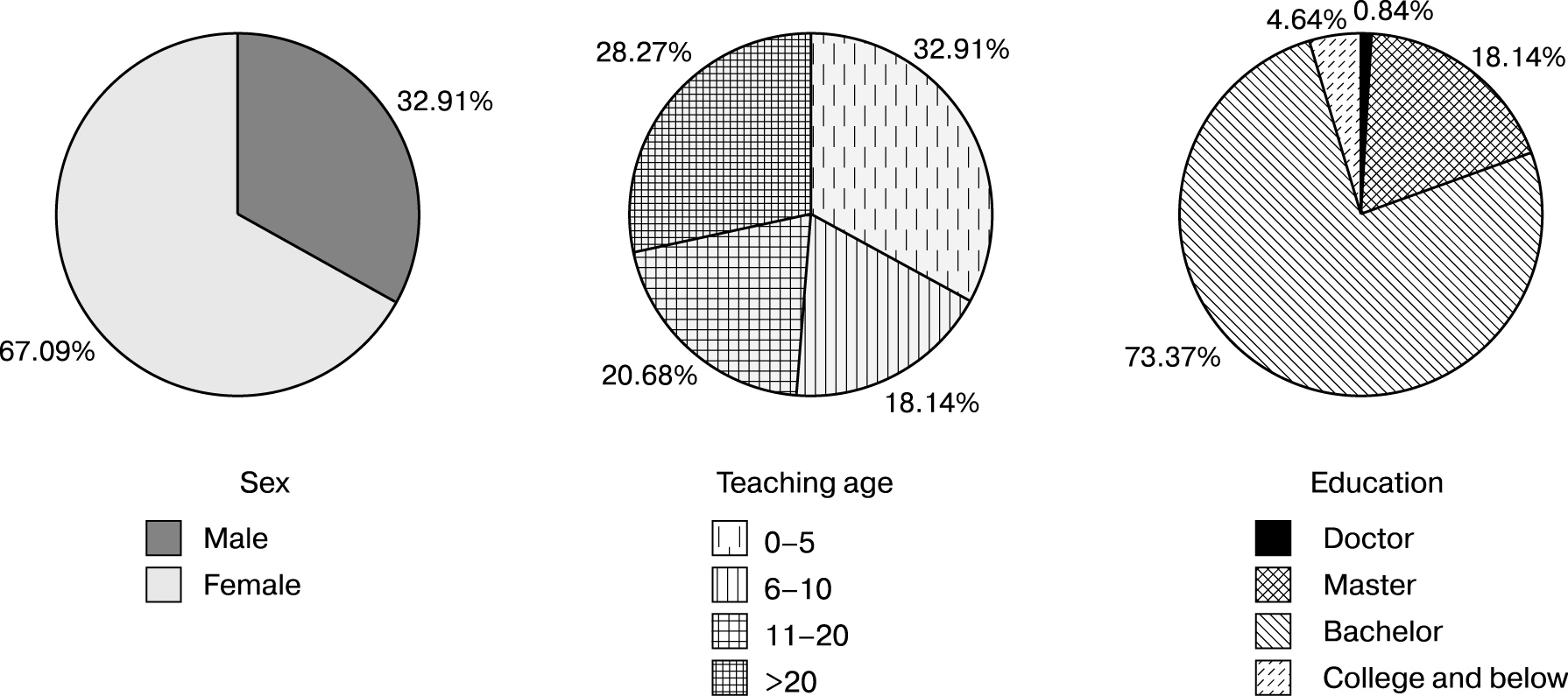
In Russia, the study participants were mainly geography teachers of secondary schools (65%), most of them were women (85%). The age of respondents ranged from 24 to 75 years (34% of them aged 40-49 years). Participants of the study (98%) had higher education (including 16% with Master's degree, Candidates or Doctors of Sciences), 62% had basic education and qualification "Geography teacher". Work experience at school ranged from 1 to 49 years.
In Ukraine, the study was attended by geography teachers, as well as heads of projects groups and school administration representatives. Participants were dominated by middle-aged and elderly people with higher education and extensive experience in school, mostly women (about 80%).
In China, the majority of respondents are school and college teachers who had a Bachelor's or Master's degree (73%). These were mostly women (67%), whose work experience ranged from 1 to 27 years. Among them, 28% were teachers with more than 20 years of experience, (other age categories are approximately the same).
It should be noted that according to experts, these features of the respondents (sex, dominant age category, level of education) adequately reflect the situation in the field of education in Russia, Ukraine and China (Munich, Khlebosolova, & Guo, 2017).
The results of teachers’ self-assessment of their readiness to introduce an integrative approach to educational practice
Research participants from Russia, Ukraine and China understand the importance of forming a unified, holistic, multidimensional scientific picture of the world. According to the majority of respondents, attracting knowledge from different scientific spheres for explaining the examples, analyzing the problems and realities of modern life is a prerequisite for modern education. However, the majority of respondents do not consider it possible to go beyond the content of the programme, because the academic time is extremely limited and does not allow doing so.
This is especially evident in the responses of Chinese teachers, of whom 96% are ready to include additional material from other scientific areas into the lesson, but only 5% of respondents do that in practice using independently selected information and their own tasks. Most teachers limit themselves to meeting the requirements of the standard and working with the textbook, which includes some explanations and examples from other scientific areas (although according to the respondents this information is often fragmentary and narrative).
Teachers and experts from Russia and Ukraine do not rely so much on ready-made educational and methodological materials. They see the gap between the standard requirements and the content of textbooks: appeals for active inclusion of knowledge from other areas into the academic discipline often remain only slogans and require creative activity from the teacher for its practical implementation Federal.
Among Russian teachers, the majority (96%) consider the use of additional material to be a condition for successful learning and the development of interest in the subject. Of these, 43% are engaged in the search for relevant information resources, develop their own tasks and at least sometimes include them into the lesson. Russian school teachers claim that textbooks and manuals do not always meet their needs: they mainly focus on the program requirements and are highly specialized.
Teachers from the three countries note the importance of the correct selection of pedagogical tools for the integrative approach implementation.
In the opinion of Russian teachers, the organization of discussions, workshops, or inquiry-based training (Figure
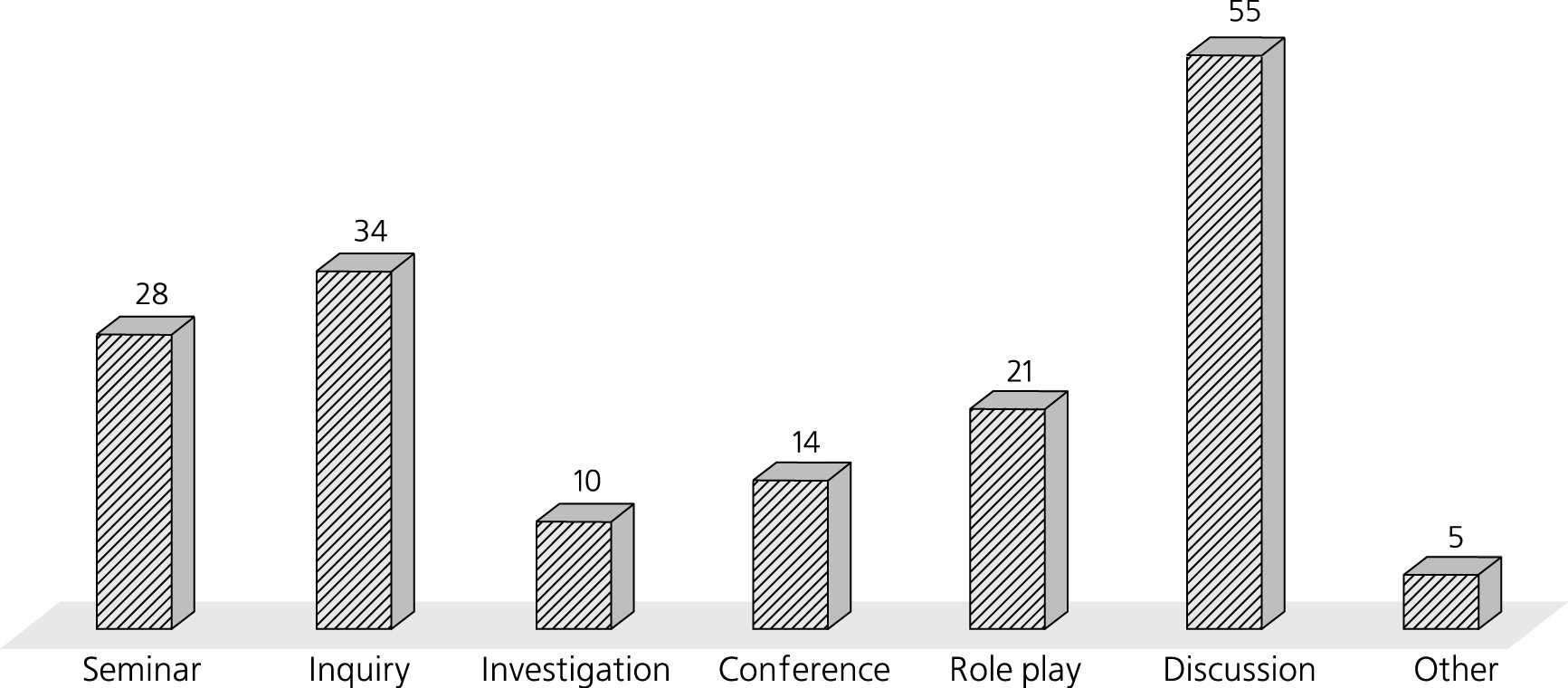
The answers of Ukrainian teachers show that in order to implement an integrative approach they often use official documents, videos, mass media information. The majority of respondents uses interactive methods in their educational practice and organizes conferences on the results of students’ research activities.
Most Chinese teachers (77%) note the need for active use of case studies which can provide the students with the inclusion of additional material into the lesson (Figure
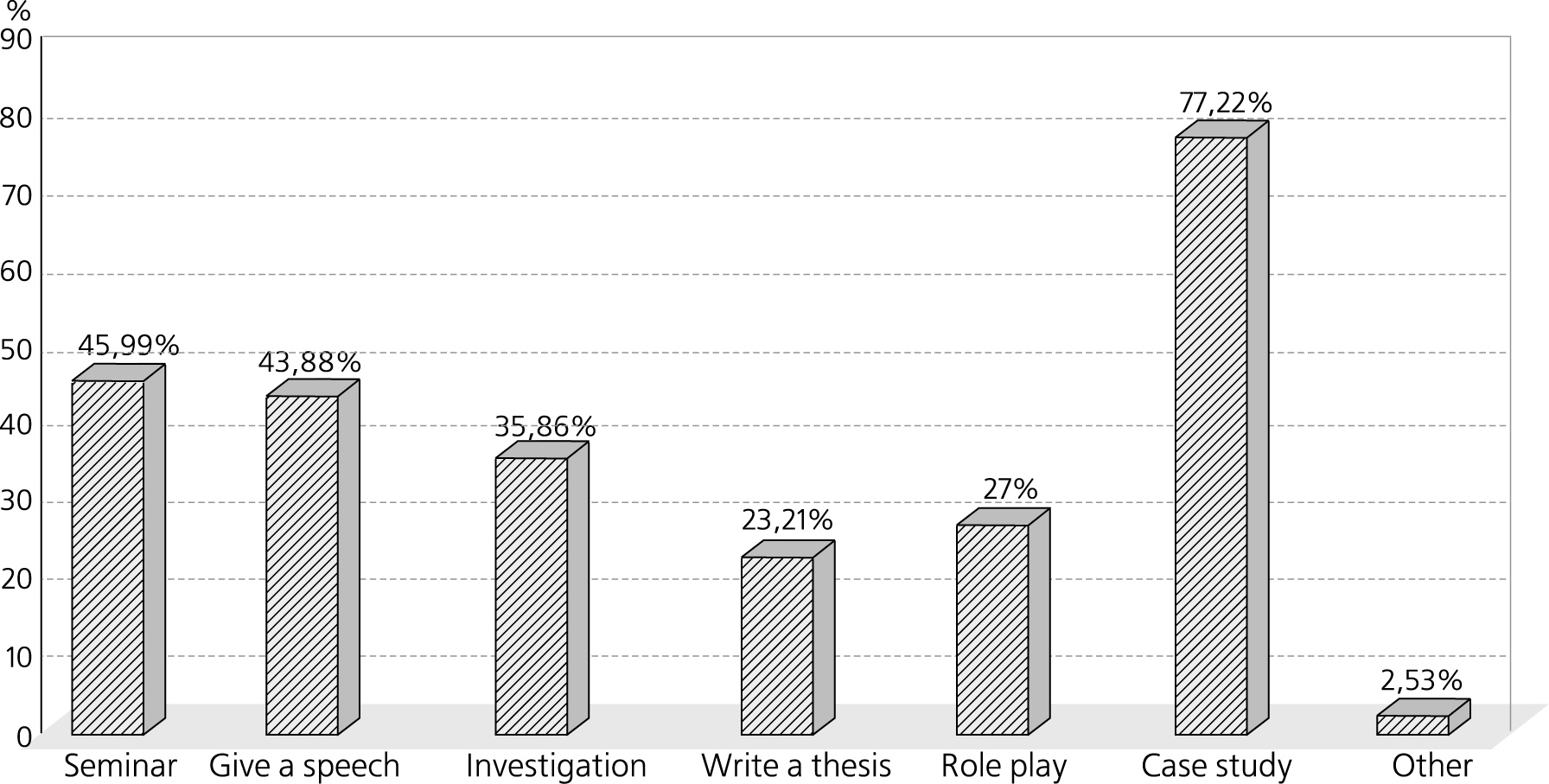
The teachers’ views on the improvement of vocational training and the introduction of an integrative approach were largely similar in Russia, Ukraine and China. Almost all participants of the study noted the need for additional education in geography-related sciences to expand knowledge and main competencies. It is the lack of knowledge in the field of basic and applied scientific research, along with an acute shortage of time and tasks to analyze real problems from practical life that, according to most respondents, prevents the active introduction of an integrative approach into education.
Teachers from three countries point out the need to improve training in basic professional education (universities) and additional education (advanced training).
Russian teachers and experts consider it most appropriate to create elective courses, the free choice of which will allow the teachers to focus on necessary questions of teaching content and methods. This approach will allow taking into account personal difficulties and problems, building an individual educational path and quick compensating for the missing knowledge and skills. Many answers emphasize that the professional growth of a geography teacher depends on his / her theoretical knowledge in economics, geopolitics, sociology, ecology, as well as his / her ability to work out educational situations based on real life problems. Respondents note the lack of special methodological literature that would contain examples of interesting programs of students’ research activities, role-playing scenarios and discussions.
Ukrainian teachers noted the need to prepare additional reference and information resources that would reflect the results of recent research in the subject and related scientific fields, provide current data and consider the most important documents. In the respondents’ opinion, methodological services should include relevant subject and methodological topics in teacher training courses.
The responses of the Chinese participants show that teaching tasks are difficult, much of the teaching time is spent on preparing for exams, so they cannot pay the necessary attention to all content issues (especially additional). According to respondents, study and life “do not intersect” in the classroom due to lack of appropriate new resources and old materials are of no interest to schoolchildren. Most of the respondents believe that real assistance to the teacher could be provided by specially prepared materials with the tasks that would involve lessons outside the classroom, experiments, social surveys, preparation of documentaries, news and advertising spots. According to teachers, the future lies in the use of new communication technologies: it is necessary to develop the sphere of informal professional communication, exchange experience, share methodological resources with all members of the pedagogical community online (Figure
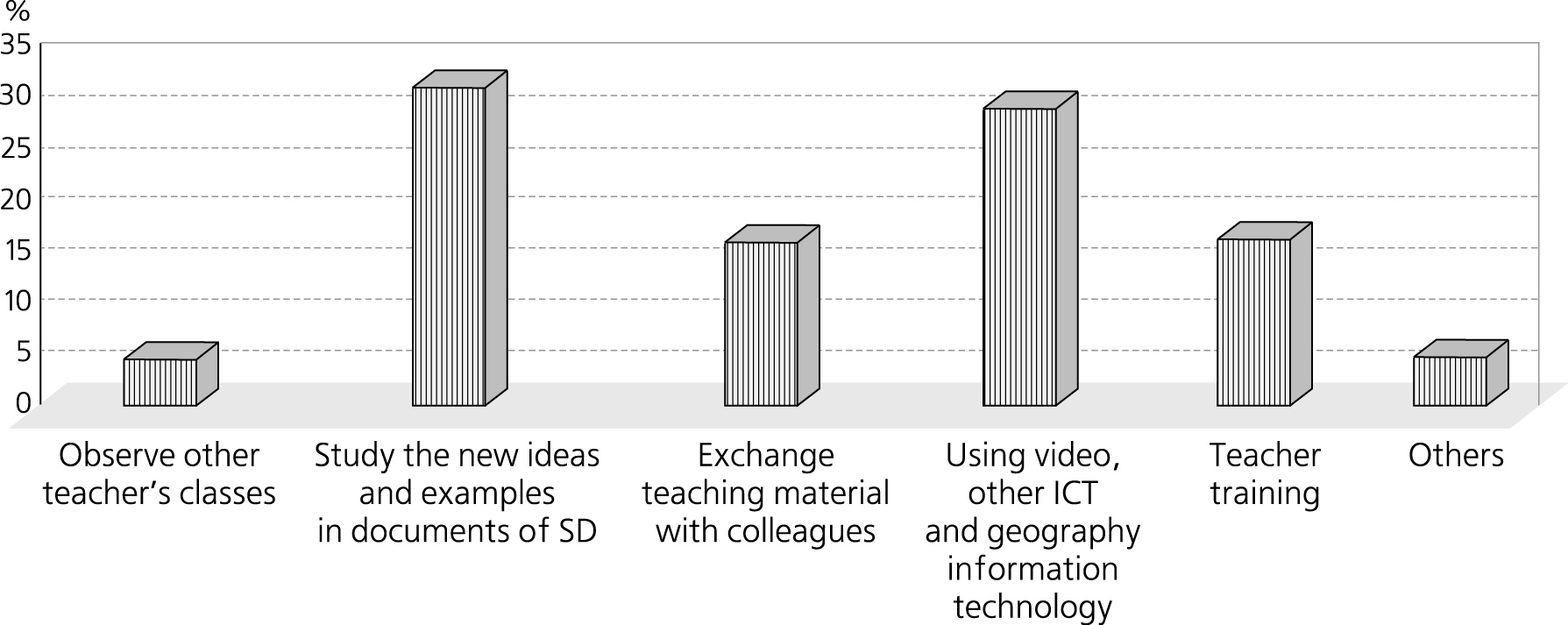
It should be noted that the respondents do not propose to introduce subjects which would integrate knowledge from different scientific fields into the school education. It indicates the desire of teachers to maintain a systematic study of special subjects. In their opinion, within any geography course, it is possible to find effective ways of “going beyond” this scientific branch.
The opinions and assessments of the study participants largely reflect the current state of professional pedagogical training systems in the three countries, their common features and differences. Comparative analysis helps to identify specific problems and unused opportunities.
Conclusion
The results of the international comparative study devoted to the readiness of teachers in Russia, Ukraine and China to the practical use of the integrative approach and the identification of promising areas for improving professional training, allows us to draw the following conclusions:
Integrative approach in education
From the teacher’s perspective, the integrative approach should be considered in its widest interpretation:
as an alternative narrow (disciplinary) training,
as a way of forming in students a holistic multidimensional world picture based on the including the most significant achievements of related fields of science in the content education,
as a method of analyzing the realities of modern life on the basis of contextual use of knowledge and skills.
Comparative analysis as the main research method
Comparative analysis based on the data obtained during interviewing, questioning, expert assessments was used as the main method of study. The choice of the comparative analysis method for identifying the readiness of teachers in Russia, Ukraine and China to use an integrative approach allowed:
to take into account the impact of cultural characteristics and national priorities and assess the diversity of educational conditions and opportunities,
to identify common problems and their causes, consider alternative solutions to the problems and identify the most promising areas of training.
The study conducted in 2015-2017 made it possible to compare the views and estimates of geography teachers from ten Russian regions, three Ukrainian cities and twenty-nine Chinese provinces (537 respondents in total).
The willingness of teachers to use an integrative approach in practice
The results of teachers’ self-assessment of their readiness for using the integrative approach indicate that, along with the differences due to the originality of the national educational systems and other reasons, their views and assessments are largely similar. General features include:
understanding by teachers the importance of forming a holistic multidimensional scientific world picture as a result of school education,
consideration of the integrative approach as a method of teaching, which involves going beyond the program material, contextual use of knowledge from different scientific spheres for analyzing the realities of modern life,
the lack of training time for active use of the integrative approach,
the need for additional information and teaching resources for systematic work,
the importance of using modern education technologies.
Peculiarities of the integrative approach implementation
The analysis of pedagogical tools used by teachers from the three countries for the implementation of an integrative approach shows that the greatest effect is given by interactive training. Besides, the originality of national preferences had noted:
Russian teachers prefer to use discussions, workshops, reference-oriented training and to involve students in research activities,
Ukrainian teachers are actively using official documents, mass media information, school scientific conferences,
Chinese teachers apply the learning through case studies, multimedia and GIS-technology, role-playing games, oral presentations, investigation lessons.
Prospects for improving the professional training system
The teachers from the three countries agree on the need to improve professional training in order to actively use the integrative approach. Perspective directions of modernization were chosen by them on the basis of the analysis of their own problems and difficulties:
Russian teachers consider it necessary to provide a teacher with a wide range of elective courses with the information on research in related scientific fields and to offer manuals with examples of programs and scenarios,
Ukrainian teachers consider it important to prepare special reference and information resources for teachers and include discussion of the latest documents, current data, research results in professional training,
Chinese teachers propose to provide teachers with ready-made methodological resources and expand the sphere of informal online communication between members of the pedagogical community.
Thus, the results of the international comparative study reflect the success of the national teacher training systems, as well as existing problems and the possible ways of solving them on the basis of broad international integration.
Acknowledgments
Special thanks we would like to express to our colleagues and friends who supported this initiative, for their valuable assistance and advice: N.A. Alexeenko, O.M. Varakuta, N.V. Vronski, M.A. Golobokova, A.N. Huseinov, I.V. Dushina, L.P. Litvin, O.P.Lukashova, Y.A. Kushel, Yu.V., Kuzina, A.V. Matveev, Yu.L. Mazurov, A.V. Kantemirova, L.F. Mel’ko, V.M. Pilipchuk, G.I. Sushko, Yu.S. Reprintseva, N.A. Ryabko, T.Yu. Semenova, Z.M. Timofeeva, G. I. Trunov, N.I. Chantseva, P.G. Shischenko, Sh.T. Efendiyeva, E.V. Iurchikova, Liqun Zhai and Wenning Duan.
References
- Duschl, R. (2007). Science Education in Three-Part Harmony: Balancing Conceptual, Epistemic and Social Learning Goals. Review of Research in Education, 32, 268-291.
- Ford, M. J., & Wargo, B. M. (2012). Dialogic framing of scientific content for conceptual and epistemic understanding. Science Education, 96(3), 369-391.
- Khlebosolova, O. (2016, August). Ideas of Sustainable Development in Geography Education in Russia, China and the Ukraine (Middle School). Paper presented at the 33rd International Geographical Congress: Book of abstracts ‘Shaping Our Harmonious World’, Beijing, China.
- Кhlebosolova, O. (2016). Sustainable Development in the School Geography Education: Current State and Trends Case Studies in Russia, China and the Ukraine. Moscow: Smysl.
- Maximchenko, N. P. (2011, June). Integrative approach to the formation of reflective competence of students of pedagogical universities. Paper presented at the Actual problems of modern pedagogy. International Scientific Conference, Ufa, Russia.
- Osborne, J. F. (2010). Arguing to Learn in Science: The Role of Collaborative, Critical Discourse. Science, 328, 463-466.
- Osborne, J. F., & Dillon, J. (2008). Science Education in Europe: Critical Reflections. London: Nuffield Foundation.
- OECD. (2000). PISA 2012 results in focus: what 15-year-olds know and what they can do with what they know. Programme for International Student Assessment. Retrieved from https://www.oecd-ilibrary.org/education/pisa-2012-results-skills-for-life-volume-v_9789264208070-en
- Stukalenko, N. M., Anishchenko, O. A., & Turtkarajeva, G. B. (2013). About Preparation of Future Teachers for Application of Innovative Study Technologies. Retrieved from http://www.lifesciencesite.com/lsj/life1012s/025_21500life1012s_139_141.pdf
Copyright information

This work is licensed under a Creative Commons Attribution-NonCommercial-NoDerivatives 4.0 International License.
About this article
Publication Date
05 September 2018
Article Doi
eBook ISBN
978-1-80296-044-0
Publisher
Future Academy
Volume
45
Print ISBN (optional)
-
Edition Number
1st Edition
Pages
1-993
Subjects
Teacher training, teacher, teaching skills, teaching techniques
Cite this article as:
Khlebosolova, O., Munich, N., Guo, F., Mashkova, A., & Shchedrova, D. (2018). Integrated Approach To Teacher Education: Comparative Study Results In Russia, Ukraine, China. In R. Valeeva (Ed.), Teacher Education - IFTE 2018, vol 45. European Proceedings of Social and Behavioural Sciences (pp. 640-650). Future Academy. https://doi.org/10.15405/epsbs.2018.09.75

